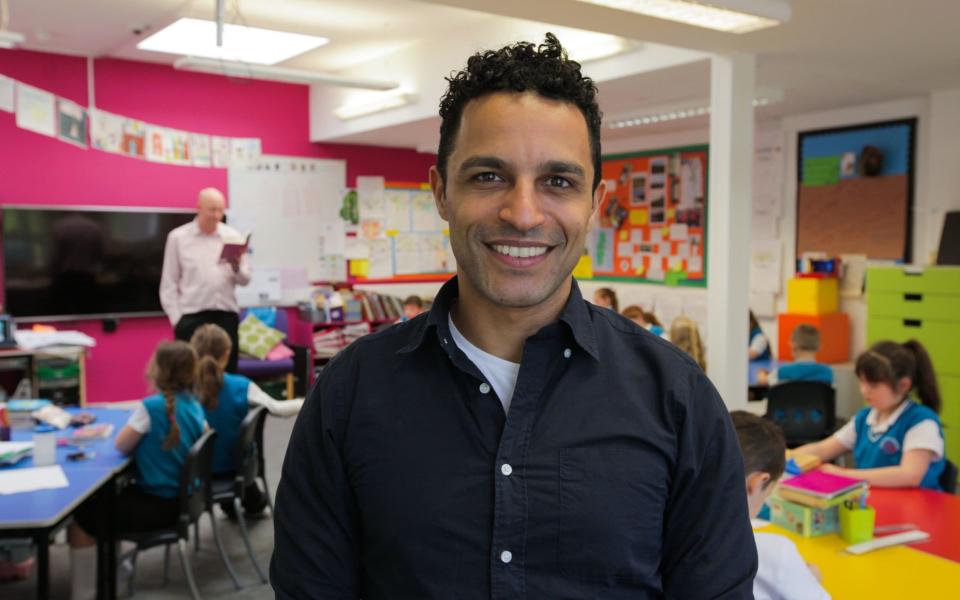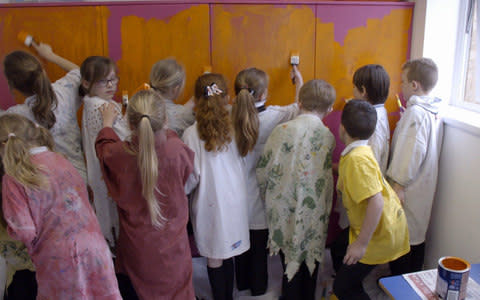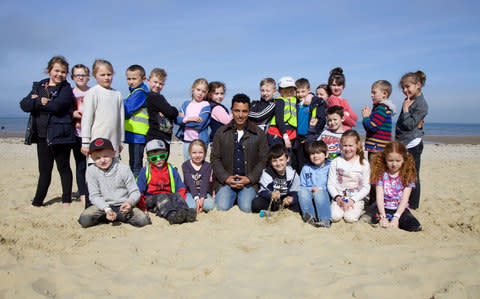What happened when a primary school went gender-neutral

When Leni Boudewijn discovered that she was expecting a girl, she prepared a pink themed nursery. Then, when Lily was an infant, she plied her with what she describes as “pink, frilly stuff.” It was an unconscious decision and one Leni had never questioned, until her daughter recently started to reprimand her. “The other day I called her ‘princess’ and she corrected me,” says Leni, 33. “She’ll remind me if I say something that isn’t gender neutral.”
Lily’s sudden awakening is the result of a controversial experiment. She is one of a class of 23 seven-year-old boys and girls from Lanesend primary school on the Isle of Wight to have spent a term ‘gender neutral’ - with all differences in the way the sexes are treated removed. The aim was to see whether such an approach could even out disparities in the children’s confidence and abilties. The results are now being shown in a new two part BBC Two documentary, No More Boys and Girls: Can Our Kids Go Gender Free?
In the programme, Presenter Dr Javid Abdelmoneim introduces gender neutral loos and persuades parents to pack away their daughters’ dolls. Signs reading “girls are strong” and “boys are sensitive” are hung on classroom walls, while books featuring passive princesses and aggressive superheroes are disposed of.

It is a provocative experiment at a time when the issue of gender in childhood has become increasingly contentious. Last year Caroline Jordan, president of the Girls’ Schools Association, said teachers should consider using gender neutral language, and many schools - such as the heavily criticised Highgate school in north London, which did so last month - are introducing gender neutral uniform policies.
Children, it seems, are becoming increasingly preoccupied with gender, with a marked rise in the number saying they identify as being either of the opposite sex, or of no sex at all. Figures published by the NHS in May this year showed that more than double the number of girls compared to boys seek to use its gender identity development service, with 1,400 ‘assigned at birth’ females seeking treatment, compared with 616 males in the past year.

Critics, meanwhile, claim the experiment places an unhealthy emphasis on it, at an age when children are too young to ask questions. Conservative Party councillor Mary Douglas, has labelled it “abusive” and “inappropriate,” and says: “Children in particular are very vulnerable and susceptible to what adults say. To even suggest that he or she might not be essentially male or female is potentially very harmful.”
To which Dr Javid – an A&E doctor when not presenting – responds strongly: “One, this is absolutely not about gender identity. Two, in no way could you imagine anyone ever trying to steer children in a way that’s harmful. We’re talking about the BBC. I’m a Doctor. Their parents and teachers were involved. Three, watch the programme and then if you still want to hold that view – well, then you’re daft.”

The documentary is predicated on Dr Javid’s belief that boys’ and girls’ brains are almost identical. He is backed by Professor Gina Rippon, a neuroscientist at Aston University in Birmingham, who insists nurture, not nature, makes girls love dolls and boys like Lego.
“You start to say that if the biology is that similar, where do these differences come from? And there were differences,” says Dr Javid.
Psychometric tests at the start of the experiment certainly show a stark divide. The boys are less able to express their emotions but more confident in their abilities, while the girls have lower self-esteem and a lesser ability to process numbers and shapes. All but one girl believe boys are “better” than them and their self-perception is largely limited to their appearance. One pupil, Kara, says “girls are better at being pretty” while another, Tiffany, declares “men are better at being in charge.” The boys are similarly old-fashioned: little Louis says “girls look after the child and boys do lots of cool stuff,” while Bradley declares “men are more successful because they could have harder jobs.”

It is like stepping back into the Fifties. Class teacher, Graham Andre, and head Caroline Sice, both admit they were “shocked” by the results - not least because Sice had already attempted to improve equality in the school with talks on inspirational women and mixed sports teams. “I thought our children would be alright. But their mind set was very fixed,” she admits.
Dr Javid says enforced gender roles start from birth with ubiquitous pink and blue congratulatory cards and “accumulate insidiously through the years with advertising, toys, clothing and our own attitudes.”
As the mother of a six year-old girl and four year-old boy, I agree we can bombard our children with unhelpful sexist paraphernalia - but I am not convinced their views are all as archaic as those at Lanesend, or that their self-esteem is suffering as a result.

Yes, my daughter Rosie is obsessed with fairies, but she is more than confident enough to put her hand up in maths. Neither she nor her female friends feel inferior, and it simply hasn’t occurred to her there might be certain jobs better suited to men.
Lily, meanwhile, seems exempt from the crisis sweeping her female classmates. Described as “outgoing” by Leni, a single mother who runs a bakery business from her home in Cowes, she wants to be a lawyer and didn’t think there was any disparity between girls and boys before the experiment. “I thought they were equal,” she tells me.
Another participant to have their eyes opened was Lily’s teacher Andre, an affable man who would call his female pupils “sweet pea” and the boys “mate.” Dr Javid tasked him to abandon the sexist prefixes, and the 45 year-old teacher admits that listening back to himself on the programme made him “cringe.”

One of the biggest upheavals comes when Dr Javid tells parents to bag up their children’s toys – a decision that is met with a wobbling lip by one princess-loving girl and incredulity by the mother of a boy who she says, despite her best efforts, has gravitated towards guns. It turns out Dr Javid doesn’t advocate binning them, however. There was, he says, “a bit of a pinch of salt for TV to make it dramatic” adding “truthfully, it’s not about taking things away but ensuring balance.”
More contentious is the decision to introduce unisex loos. Andre has said that the parents were unhappy and the old system has since been restored. A spokesperson for the programme won’t let him discuss it with me, saying it is “not something we need to focus on at the moment

Three months after the cameras left Lanesend and Andre – now addressing pupils by name only – has had chance to reflect. He now firmly believes gender neutrality “is something we need to look at as a country and somehow get into the curriculum.”
The risk is creating an issue around gender in schools where none exists. That said, the supremely confident Lily - now the proud owner of a Star Wars Lego set – is more ambitious than ever. “She realises she can achieve more and be stronger,” says Leni. “Being gender neutral is fairer for her.”
To critics, Dr Javid adds: “This is about giving children a full development so they can achieve absolutely anything they want. I’d challenge any sane and sensible adult to say we don’t want that.”
No More Boys and Girls: Can Our Kids Go Gender Free?, starts on BBC Two on August 16 at 9pm

